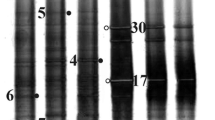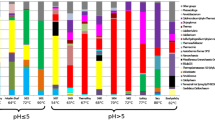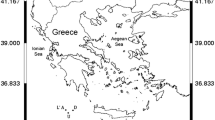Abstract
The "El Chichón" crater-lake in Mexico is a thermo-acidic environment whose microorganisms have been scarcely studied. In this study, we surveyed the prokaryotic communities by amplicon sequencing of the 16S rRNA gene considering samples of sediment and water collected within a pH/temperature gradient (pH 1.9–5.1, 38–89 °C). Further, we interpreted these results within a physicochemical context. The composition of the microbial assemblage differed significantly between the sediments and water. Sediment communities were different in the site with the highest temperature and lower pH value compared to the other ones sampled, while those in the water were relatively similar at all points. Most of the genera found were related to Alicyclobacillus, Acinetobacter, Bacillus, Mesoaciditoga, Methanothermobacter, Desulfitobacterium, Therminicanus, Kyrpidia, Paenibacillus, Thermoanaerobacterium, and Gelria. Some of these genera are known by their thermo-acidic tolerant capacities with flexible metabolisms to use diverse electron donor/acceptors (S or Fe), while others are thermo(acid)philes that mainly occur in the most extreme sites of the lake. These results show the presence of a microbial community adapted to the changing conditions of a very dynamic crater-lake, that include chemoorganotrophs and chemolithotrophs.






Similar content being viewed by others
References
Abecasis AB, Serrano M, Alves R, Quintais L, Pereira-Leal JB, Hemriques AO (2013) A genomic signature and the identification of new sporulation genes. J Bacteriol 195:2101–2115. https://doi.org/10.1128/JB.02110-12
Alazard D, Joseph M, Battaglia-Brunet F, Cayol JL, Ollivier B (2010) Desulfosporosinus acidiphilus sp. nov.: a moderately acidophilic sulfate-reducing bacterium isolated from acid mining drainage sediments: new taxa: Firmicutes (Class Clostridia, Order Clostridiales, Family Peptococcaceae). Extremophiles 14(3):305–312. https://doi.org/10.1007/s00792-010-0309-4
Altschul SF, Gish W, Miller W, Myers EW, Lipman DJ (1990) Basic local alignment search tool. J Mol Biol 215(3):403–410. https://doi.org/10.1016/S0022-2836(05)80360-2
Apprill A, McNally S, Parsons R, Weber L (2015) Minor revision to V4 region SSU rRNA 806R gene primer greatly increases detection of SAR11 bacterioplankton. Aquat Microb Ecol 75:129–137. https://doi.org/10.3354/ame01753
Arce-Rodríguez A, Puente-Sánchez F, Avendaño R, Martínez-Cruz M, de Moor JM, Pieper DH, Chavarría M (2019) Thermoplasmatales and sulfur-oxidizing bacteria dominate the microbial community at the surface water of a CO2-rich hydrothermal spring located in Tenorio Volcano National Park, Costa Rica. Extremophiles 23:177–187. https://doi.org/10.1007/s00792-018-01072-6
Armienta MA, De la Cruz-Reyna S, Macías JL (2000) Chemical characteristics of the crater lakes of Popocatepetl, El Chichon, and Nevado de Toluca volcanoes, Mexico. J Volcanol Geotherm Res 97:105–125. https://doi.org/10.1016/S0377-0273(99)00157-2
Armienta MA, Vilaclara G, De la Cruz-Reyna S, Ramos S, Ceniceros N, Cruz O, Aguayo A, Arcega-Cabrera F (2008) Water chemistry of lakes related to active and inactive Mexican volcanoes. J Volcanol Geotherm Res 178:249–258. https://doi.org/10.1016/j.jvolgeores.2008.06.019
Armienta MA, De la Cruz-Reyna S, Ramos S, Ceniceros N, Cruz O, Aguayo A, Arcega-Cabrera F (2014) Hydrogeochemical surveillance at El Chichón volcano crater lake, Chiapas, Mexico. J Volcanol Geotherm Res 285:118–128. https://doi.org/10.1016/j.jvolgeores.2014.08.011
Aszalós JM, Krett G, Anda D, Márialigeti K, Nagy B, Borsodi AK (2016) Diversity of extremophilic bacteria in the sediment of high-altitude lakes located in the mountain desert of Ojos del Salado volcano, Dry-Andes. Extremophiles 20:603–620. https://doi.org/10.1007/s00792-016-0849-3
Bennett PC, Rogers JR, Choi WJ (2001) Silicates, silicate weathering, and microbial ecology. Geomicrobiol J 18(1):3–19. https://doi.org/10.1080/01490450151079734
Berg IA, Kockelkorn D, Ramos-Vera WH, Say RF, Zarzycki J, Hügler M, Alber BE, Fuchs G (2010) Autotrophic carbon fixation in archaea. Nat Rev Microbiol 8:447–460. https://doi.org/10.1038/nrmicro2365
Bolyen E, Rideout JR, Dillon MR et al (2019) Reproducible, interactive, scalable and extensible microbiome data science using QIIME2. Nat Biotechnol 37:852–857. https://doi.org/10.1038/s41587-019-0209-9
Callahan BJ, McMurdie PJ, Rosen MJ, Han AW, Johnson AJA, Holmes SP (2016) DADA2: high-resolution sample inference from Illumina amplicon data. Nat Methods 13:581–583. https://doi.org/10.1038/nmeth.3869
Casadevall TJ, De la Cruz-Reyna S, Rose WI Jr, Bagley S, Finnegan DL, Zoller WH (1984) Crater lake and post-eruption hydrothermal activity, El Chichón Volcano, México. J Volcanol Geotherm Res 23:169–191. https://doi.org/10.1016/0377-0273(84)90061-1
Casas AS, Armienta MA, Ramos S (2016) Sulfur speciation with high performance liquid chromatography as a tool for El Chichón volcano, crater lake monitoring. J S Am Earth Sci 72:241–249. https://doi.org/10.1016/j.jsames.2016.09.001
Cuoco E, De Francesco S, Tedesco D (2013) Hydrogeochemical dynamics affecting steam-heated pools at El Chichón crater (Chiapas – Mexico). Geofluids 13:331–343. https://doi.org/10.1111/gfl.12028
D’Auria G, Artacho A, Rojas RA, Bautista JS, Méndez R, Gamboa MT, Gamboa JR, Gómez-Cruz R (2018) Metagenomics of bacterial diversity in Villa Luz caves with sulfur water springs. Genes 9:55. https://doi.org/10.3390/genes9010055
Delmelle O, Bernard A (1994) Geochemistry, mineralogy, and chemical modeling of the acid crater lake of Kawah Ijen Volcano, Indonesia. Geochim Cosmochim Acta 58:2445–2460. https://doi.org/10.1016/0016-7037(94)90023-X
Diender M, Stams AJM, Sousa DZ (2015) Pathways and bioenergetics of anaerobic carbon monoxide fermentation. Front Microbiol 6:1275. https://doi.org/10.3389/fmicb.2015.01275
Drake HL (2015) Thermicanus. In: Trujillo ME, Dedysh S, De Vos P, Hedlund B, Kämpfer P, Rainey FA, Whitman WB (eds) Bergey’s manual of systematics of archaea and bacteria. John Wiley & Sons, Bergey’s Manual Trust
Falteisek L, Cepicka I (2012) Microbiology of diverse acidic and non-acidic microhabitats within a sulfidic ore mine. Extremophiles 16:911–922. https://doi.org/10.1007/s00792-012-0488-2
Filippidou S, Wunderlin T, Junier T, Jeanneret N, Dorador C, Molina V, Johnson DR, Junier P (2016) A combination of extreme environmental conditions favor the prevalence of endospore-forming firmicutes. Front Microbiol 7:1707. https://doi.org/10.3389/fmicb.2016.01707
Göbner AS, Devereux R, Ohnemüller N, Acker G, Stackebrandt E, Drake HL (1999) Thermicanus aegyptius gen. nov., sp. nov., isolated from oxic soil, a fermentative microaerophile that grows commensally with the thermophilic acetogen Moorella thermoacetica. Appl Environ Microbiol 65:5124–5133. https://doi.org/10.1128/AEM.65.11.5124-5133.1999
Gouy M, Guindon S, Gascuel O (2010) SeaView version 4: a multiplatform graphical user interface for sequence alignment and phylogenetic tree building. Mol Biol Evol 27(2):221–224. https://doi.org/10.1093/molbev/msp259
Gross W (2000) Ecophysiology of algae living in highly acidic environments. Hydrobiologia 433:31–37. https://doi.org/10.1023/A:1004054317446
Guo X, You XY, Liu LJ, Zhang JY, Liu SJ, Jiang CY (2009) Alicyclobacillus aeris sp. nov., a novel ferrous- and sulfur-oxidizing bacterium isolated from a copper mine. Int J Syst Evol Microbiol 59:2415–2420. https://doi.org/10.1099/ijs.0.008870-0
He Z, Xiao S, Xie X, Zhong H, Hu Y, Li Q, Gao F, Li G, Liu J, Qiu G (2007) Molecular diversity of microbial community in acid mine drainages of Yunfu sulfide mine. Extremophiles 11:305–314. https://doi.org/10.1007/s00792-006-0044-z
Hoehler T, Gunsalus RP, McInerney MJ (2010) Environmental constraints that limit methanogenesis. Handbook of hydrocarbon and lipid microbiology. Springer, pp 635–654
Hynek BM, Rogers KL, Antunovich M, Avard G, Alvarado GE (2018) Lack of microbial diversity in an extreme mars analog setting: Poás Volcano, Costa Rica. Astrobiology 18:923–933. https://doi.org/10.1089/ast.2017.1719
Kanoksilapatham W, Keawram P, Gonzalez JM, Robb FT (2015) Isolation, characterization, and survival strategies of Thermotoga sp. strain PD524, a hyperthermophile from a hot spring in Northern Thailand. Extremophiles 19:853–861. https://doi.org/10.1007/s00792-015-0761-2
Katoh K, Misawa K, Kuma KI, Miyata T (2002) MAFFT: a novel method for rapid multiple sequence alignment based on fast Fourier transform. Nucleic Acids Res 30:3059–3066. https://doi.org/10.1093/nar/gkf436
Kelly DP, Wood AP (2000) Reclassification of some species of Thiobacillus to the newly designated genera Acidithiobacillus gen. nov., Halothiobacillus gen. nov. and Thermithiobacillus gen. nov. Int J Syst Evol Microbiol 50(2):511–516. https://doi.org/10.1099/00207713-50-2-511
Klenk HP, Lapidus A, Chertkov O, Copeland A et al (2011) Complete genome sequence of the thermophilic, hydrogen-oxidizing Bacillus tusciae type strain (T2) and reclassification in the new genus, Kyrpidia gen. nov. as Kyrpidia tusciae comb. nov. and emendation of the family Alicyclobacillaceae da Costa and Rainey, 2010. Stand Genomic Sci 5:121–134. https://doi.org/10.4056/sigs.2144922
Koschorreck M, Wendt-Potthoff K, Scharf B, Richnow HH (2008) Methanogenesis in the sediment of the acidic Lake Caviahue in Argentina. J Volcanol Geotherm 178(2):197–204. https://doi.org/10.1016/j.jvolgeores.2008.06.017
Kouzuma A, Tsutsumi M, Ishii S, Ueno Y, Abe T, Watanabe K (2017) Non-autotrophic methanogens dominate in anaerobic digesters. Sci Rep 7:1510. https://doi.org/10.1038/s41598-017-01752-x
Löhr AJ, Laverman AM, Braster M, van Straalen NM, Röling WFM (2006) Microbial communities in the world’s largest acidic volcanic lake, Kawah Ijen in Indonesia, and in the Banyupahit river originating from it. Microb Ecol 52:609–618. https://doi.org/10.1007/s00248-006-9068-2
Lopez-Bedogni G, Massello FL, Giaveno A, Donati ER, Urbieta MS (2019) A deeper look into the biodiversity of the extremely acidic copahue volcano-Río agrio system in Neuquén, Argentina. Microorganisms 8:58. https://doi.org/10.3390/microorganisms8010058
Lozupone C, Lladser ME, Knights D, Stombaugh J, Knight R (2011) UniFrac: an effective distance metric for microbial community comparison. ISME J 5(2):169–172. https://doi.org/10.1038/ismej.2010.133
Luhr JF, Carmichael ISE, Varekamp JC (1984) The 1982 eruptions of El Chichón volcano, Chiapas, Mexico: mineralogy and petrology of the anhydrite- bearing pumices. J Volcanol Geotherm Res 23:69–108. https://doi.org/10.1016/0377-0273(84)90057-X
Mapelli F, Marasco R, Rolli E, Daffonchio D, Donachie S, Borin S (2015) Microbial life in volcanic lakes. In: Rouwet D, Christenson B, Tassi F, Vandemeulebrouck J (eds) Volcanic lakes. Advances in volcanology. Springer, Berlin, Heidelberg, pp 507–522
Matthieu B, Wunderlin T, Roussel-Delif L, Junier T, Sauvain L, Jeanneret N, Junier P (2013) Quantification of endospore-forming firmicutes by quantitative PCR with the functional gene spo0A. Appl Environ Microbiol 79:5302–5312. https://doi.org/10.1128/AEM.01376-13
Mazot A, Rouwet D, Taran Y, Inguaggiato S, Varley N (2011) CO2 and He degassing at El Chichón volcano, Chiapas, Mexico: gas flux, origin and relationship with local and regional tectonics. Bull Volcanol 73(4):423–441. https://doi.org/10.1007/s00445-010-0443-y
McMurdie PJ, Holmes S (2013) Phyloseq: an R package for reproducible interactive analysis and graphics of microbiome census data. PLoS ONE 8:e61217. https://doi.org/10.1371/journal.pone.0061217
Medrano-Santillana M, Souza-Brito EM, Duran R, Gutierrez-Corona F, Reyna-López GE (2017) Bacterial diversity in fumarole environments of the Paricutín volcano, Michoacán (Mexico). Extremophiles 21:499–511. https://doi.org/10.1007/s00792-017-0920-8
Merkel AY, Pimenov NV, Rusanov II, Slobodkin AI, Slobodkina GB, Tarnovetckii IY, Frolov EN, Dubin AV, Perevalova AA, Bonch-Osmolovskaya EA (2016) Microbial diversity and autotrophic activity in Kamchatka hot springs. Extremophiles 21:307–317. https://doi.org/10.1007/s00792-016-0903-1
Ohsawa S, Saito T, Yoshikawa S, Mawatari H, Yamada M, Amita K, Takamatsu N, Sudo Y, Kagiyama T (2010) Color change of lake water at the active crater lake of Aso volcano, Yudamari, Japan: is it in response to change in water quality induced by volcanic activity? Limnology 11:207–215. https://doi.org/10.1007/s10201-009-0304-6
Onda Y, Ohswa S, Takamatsu N (2003) A colorimetric and geochemical study of the coloration factor of hyper-acid active crater lakes. Jap J Limnol 64:1–10. https://doi.org/10.3739/rikusui.64.1
Opazo-Capurro A, Higgins PG, Wille J, Seifert H, Cigarroa C et al (2019) Genetic features of Antarctic Acinetobacter radioresistens strain A154 harboring multiple antibiotic-resistance genes. Front Cell Infect Microbiol 9:328. https://doi.org/10.3389/fcimb.2019.00328
Oppenheimer C (1997) Remote sensing of the colour and temperature of volcanic lakes. Int J Remote Sens 18:5–37. https://doi.org/10.1080/014311697219259
Ortiz-Cortés LY, Ventura-Canseco L, Abud-Archila M et al (2021) Evaluation of temperature, pH and nutrient conditions in bacterial growth and extracellular hydrolytic activities of two Alicyclobacillus spp. strains. Arch Microbiol 203(7):4557–4570. https://doi.org/10.1007/s00203-021-02332-4
Pagaling E, Grant WD, Cowan DA, Jones BE, Ma Y, Ventosa A, Heaphy S (2012) Bacterial and archaeal diversity in two hot spring microbial mats from the geothermal region of Tengchong, China. Extremophiles 16:607–618. https://doi.org/10.1007/s00792-012-0460-1
Parada AE, Needham DM, Fuhrman JA (2016) Every base matters: assessing small subunit rRNA primers for marine microbiomes with mock communities, time series and global field samples. Environ Microbiol 18:1403–1414. https://doi.org/10.1111/1462-2920.13023
Peña-Ocaña BA, Ovando-Ovando CI, Puente-Sánchez F et al (2022) Metagenomic and metabolic analyses of poly-extreme microbiome from an active crater volcano lake. Environ Res 203:111862. https://doi.org/10.1016/j.envres.2021.111862
Plugge CM, Balk M, Zoetendal EG, Stams A (2002) Gelria glutamica gen. nov., sp. nov., a thermophilic, obligately syntrophic, glutamate-degrading anaerobe. Int J Syst Evol Microbiol 52:401–407. https://doi.org/10.1099/00207713-52-2-401
Pollio A, Cennamo P, Ciniglia C, De Stefano M, Pinto G, Huss VA (2005) Chlamydomonas pitschmannii Ettl, a little known species from thermoacidic environments. Protist 156:287–302. https://doi.org/10.1016/j.protis.2005.04.004
Prat L, Maillard J, Grimaud R, Holliger C (2011) Physiological adaptation of Desulfitobacterium hafniense strain TCE1 to tetrachloroethene respiration. Appl Environ Microbiol 77:3853–3859. https://doi.org/10.1128/AEM.02471-10
Price MN, Dehal PS, Arkin AP (2010) FastTree 2 – approximately maximum-likelihood trees for large alignments. PLoS ONE 5:e9490. https://doi.org/10.1371/journal.pone.0009490
R Core Team (2013) R: a language and environment for statistical computing. R Foundation for Statistical Computing, Vienna, Austria. http://www.R-project.org/.
Reiner JE, Jung T, Lapp CJ, Siedler M, Bunk B, Overmann J, Gescher J (2018) Kyrpidia spormannii sp. nov., a thermophilic, hydrogen-oxidizing, facultative autotroph, isolated from hydrothermal systems at São Miguel Island, and emended description of the genus Kyrpidia. Int J Syst Evol Microbiol 68:3735–3740. https://doi.org/10.1099/ijsem.0.003037
Reysenbach AL, Liu Y, Lindgren AR, Wagner ID, Sislak CD, Mets A, Schouten S (2013) Mesoaciditoga lauensis gen. nov., sp. nov., a moderately thermoacidophilic member of the order Thermotogales from a deep-sea hydrothermal vent. Int J Syst Evol Microbiol 63:4724–4729. https://doi.org/10.1099/ijs.0.050518-0
Rincón-Molina CI, Hernández-García JA, Rincón-Rosales, et al (2019) Structure and diversity of the bacterial communities in the acid and thermophilic crater-lake of the volcano “El Chichón”, Mexico. Geomicrobiol J 36:97–109. https://doi.org/10.1080/01490451.2018.1509158
Ritchie ME, Phipson B, Wu D, Hu Y, Law CW, Shi W, Smyth GK (2015) Limma powers differential expression analyses for RNA-sequencing and microarray studies. Nucleic Acids Res 43(7):e47. https://doi.org/10.1093/nar/gkv007
Rojas-Gätjens D, Arce-Rodríguez A, Puente-Sánchez F et al (2021) Temperature and elemental sulfur shape microbial communities in two extremely acidic aquatic volcanic environments. Extremophiles 25(1):85–99. https://doi.org/10.1007/s00792-020-01213-w
Rosales-Lagarde L, Boston PJ, Campbell A, Stafford KW (2006) Possible structural connection between Chichón Volcano and the sulfur-rich springs of Villa Luz cave (a.k.a. Cueva de las Sardinas), southern Mexico. Bull Assoc Mex Cave Stud (austin, TX) 19:177–184
Rouwet D, Taran Y, Inguaggiato S, Varley N, Santiago-Santiago JA (2008) Hydrochemical dynamics of the “lake–spring” system in the crater of El Chichón volcano (Chiapas, Mexico). J Volcanol Geotherm Res 178:237–248. https://doi.org/10.1016/j.jvolgeores.2008.06.026
Ruíz-Valdiviezo VM, Luna-Guido M, Galzy A, Gutiérrez-Miceli FA, Dendooven L (2010) Greenhouse gas emissions and C and N mineralization in soils of Chiapas (México) amended with leaves of Jatropha curcas L. Appl Soil Ecol 46:17–25. https://doi.org/10.1016/j.apsoil.2010.06.002
Sabater S, Buchaca T, Cambra J, Catalan J, Guasch H, Ivorra N, Muñoz I, Navarro E, Real M, Romaní A (2003) Structure and function of benthic algal communities in an extremely acid river. J Phycol 39:481–489. https://doi.org/10.1046/j.1529-8817.2003.02104.x
Sánchez-Andrea I, Rodríguez N, Amils R, Sanz JL (2011) Microbial diversity in anaerobic sediments at Rio Tinto, a naturally acidic environment with a high heavy metal content. Appl Environ Microbiol 77:6085–6093. https://doi.org/10.1128/AEM.00654-11
Sánchez-Andrea I, Rojas-Ojeda P, Amils R, Sanz JL (2012) Screening of anaerobic activities in sediments of an acidic environment: Tinto River. Extremophiles 16:829–839. https://doi.org/10.1007/s00792-012-0478-4
Sánchez-Andrea I, Sanz JL, Bijmans MF, Stams AJ (2014) Sulfate reduction at low pH to remediate acid mine drainage. J Hazard Mater 269:98–109. https://doi.org/10.1016/j.jhazmat.2013.12.032
Satake K (1977) Microbial sulphate reduction in a volcanic acid lake having pH 1.8 to 2. Jap J Limnol 38:33–35. https://doi.org/10.3739/rikusui.38.33
Sigurdsson H (1977) Chemistry of the crater lake during the 1971–72 Soufriére eruption. J Volcanol Geotherm Res 2:165–186. https://doi.org/10.1016/0377-0273(77)90008-7
Takano B, Koshida M, Fujiwara Y, Sugimori K, Takayanagi S (1997) Influence of sulfur oxidizing bacteria on the budget of sulfate in Yugama crater lake, Kusatsu-Shirane volcano, Japan. Biogeochemistry 38:227–253. https://doi.org/10.1023/A:1005805100834
Taran Y, Peiffer L (2009) Hydrology, hydrochemistry and geothermal potential of El Chichón volcano-hydrothermal system, Mexico. Geothermics 38:370–378. https://doi.org/10.1016/j.geothermics.2009.09.002
Taran Y, Fischer TP, Pokrovsky B, Sano Y, Armienta MA, Macias JL (1998) Geochemistry of the volcano-hydrothermal system of El Chichón Volcano, Chiapas, Mexico. Bull Volcanol 59:436–449. https://doi.org/10.1007/s004450050202
Tassi F, Vaselli O, Capaccioni B, Macias JL, Nencetti A, Montegrossi G, Magro G (2003) Chemical composition of fumarolic gases and spring discharges from El Chichón volcano, Mexico: causes and implications of the changes detected over the period 1998–2000. J Volcanol Geotherm Res 123:105–121. https://doi.org/10.1016/S0377-0273(03)00031-3
Tobler DJ, Benning LG (2011) Bacterial diversity in five Icelandic geothermal waters: temperature and sinter growth rate effects. Extremophiles 15:473–485. https://doi.org/10.1007/s00792-011-0378-z
Topçuoğlu BD, Holden JF (2019) Extremophiles: hot environments. In: Schmidt TM (ed) Encyclopedia of microbiology, 4th end. Elsevier Publishing, Oxford, UK, pp 263–269
Vésteinsdóttir H, Reynisdóttir DB, Örlygsson J (2011) Thiomonas islandica sp. nov., a moderately thermophilic, hydrogen- and sulfur-oxidizing betaproteobacterium isolated from a hot spring. Int J Syst Evol Micr 61:132–137. https://doi.org/10.1099/ijs.0.015511-0
Villemur R, Lanthier M, Beaudet R, Lépine F (2006) The Desulfitobacterium genus. FEMS Microbiol Rev 30:706–733. https://doi.org/10.1111/j.1574-6976.2006.00029.x
Ward L, Taylor MW, Power JF, Scott BJ, McDonald IR, Stott MB (2017) Microbial community dynamics in Inferno crater lake, a thermally fluctuating geothermal spring. ISME J 11:1158–1167. https://doi.org/10.1038/ismej.2016.193
Wendt-Potthoff K, Koschorreck M (2002) Functional groups and activities of bacteria in a highly acidic volcanic mountain stream and lake in Patagonia, Argentina. Microb Ecol 43:92–106. https://doi.org/10.1007/s00248-001-1030-8
Willis G, Nancucheo I, Hedrich S, Giaveno A, Donati E, Johnson DB (2019) Enrichment and isolation of acid-tolerant sulfate-reducing microorganisms in the anoxic, acidic hot spring sediments from Copahue volcano. Argentina. FEMS Microbiol Ecol 95(12):fiz175. https://doi.org/10.1093/femsec/fiz175
Wunderlin T, Junier T, Roussel-Delif L, Jeanneret N, Junier P (2013) Stage 0 sporulation gene A as a molecular marker to study diversity of endospore-forming Firmicutes. Environ Microbiol Rep 5:911–924. https://doi.org/10.1111/1758-2229.12094
Yaakob MA, Mohamed RMSR, Al-Gheethi A, Aswathnarayana Gokare R, Ambati RR (2021) Influence of nitrogen and phosphorus on microalgal growth, biomass, lipid, and fatty acid production: an overview. Cells 10(2):393. https://doi.org/10.3390/cells10020393
Yahya A, Hallberg KB, Johnson DB (2008) Iron and carbon metabolism by a mineral-oxidizing Alicyclobacillus-like bacterium. Arch Microbiol 89:305–312. https://doi.org/10.1007/s00203-007-0319-5
Yakkala H, Samantarrai D, Gribskov M, Siddavattam D (2019) Comparative genome analysis reveals niche specific genome expansion in Acinetobacter baumannii strains. PLoS ONE 14:e0218204. https://doi.org/10.1371/journal.pone.0218204
Zamora-Martinez O, Montao-Hilario JM, Galindo-Zavala VB, Siebe C, Prado-Pano BL (2016) Simultaneous determination of major cations in samples of waste water by means of chromatography of ions with conductometric detection. Rev Int Contam Ambient 32:293–301. https://doi.org/10.20937/RICA.2016.32.03.04
Acknowledgements
We thank Olivia Zamora-Martínez, for her valuable technical support in the analyses of anions and cations by Ion chromatography and T. Pi-Puig for X-Ray Diffraction analyses. We also acknowledge the infrastructure of the National Laboratory "Laboratorio Nacional de Geoquímica y Mineralogía", LANGEM.
Funding
This work was supported by UNAM-PAPIIT IN121420. Project ‘CB-2015- 253281’ ‘Consejo Nacional de Ciencia y Tecnología’ (CONACyT, Mexico) and Project No. 8216.20-P ‘Tecnológico Nacional de Mexico’ (TecNM, México) I.O V.-R received grant-aided support from CONACyT (766230).
Author information
Authors and Affiliations
Corresponding authors
Additional information
Communicated by A. Oren.
Publisher's Note
Springer Nature remains neutral with regard to jurisdictional claims in published maps and institutional affiliations.
Supplementary Information
Below is the link to the electronic supplementary material.
Rights and permissions
About this article
Cite this article
Velázquez-Ríos, I.O., Rincón-Rosales, R., Gutiérrez-Miceli, F.A. et al. Prokaryotic diversity across a pH gradient in the “El Chichón” crater-lake: a naturally thermo-acidic environment. Extremophiles 26, 8 (2022). https://doi.org/10.1007/s00792-022-01257-0
Received:
Accepted:
Published:
DOI: https://doi.org/10.1007/s00792-022-01257-0




